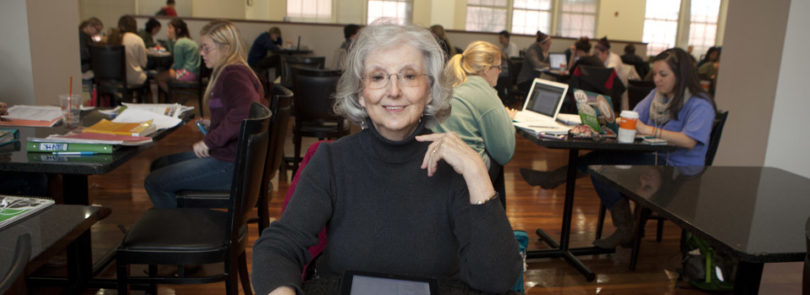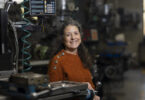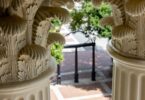Donna Alvermann, Distinguished Research Professor of Language and Literacy Education and Omer Clyde and Elizabeth Parr Aderhold Professor in Education, wants her students to view learning as an ongoing and impassioned process.
Where did you earn degrees and what are your current responsibilities at UGA?
I majored in education and minored in history at the University of Texas at Austin. At the time I earned both my B.S. and M.A. degrees, Texas oil underwrote student tuition and fees for residents of that state. Hook-’em Horns! After teaching for 12 years in the public schools of Texas and New York, I enrolled in a doctoral program in reading and language education at Syracuse University, where I earned a second master’s (this time in library science) and completed my Ph.D. in reading and language arts. My current responsibilities as a Distinguished Research Professor and Aderhold Professor at UGA include teaching, researching, writing grants and mentoring graduate students and new faculty in the department of language and literacy education. I’m also a Fellow in the Owens Institute for Behavioral Research and an affiliate faculty member of the UGA Institute for African American Studies.
When did you come to UGA and what brought you here?
The 1982-83 academic year was my introduction to this exciting university, and I’ve enjoyed the students and faculty immensely in the three decades that have followed. A former Bulldawg and Athenian who just happened to be my department head at a university in the Midwest recommended that I look into a position that was open here. He said he wasn’t trying to get rid of me, but he couldn’t imagine a better academic home than this university. I interviewed in the dead of winter (but an early spring on campus) and fell in love with the setting of this historic university.
What are your favorite courses and why?
Two graduate-level courses are my favorites: one is “Popular Culture and Literacy in K-12 Classrooms,” and the other is “Digital Literacies.” They’re favorites because they allow me to integrate research, teaching and personal interests. These courses are challenging to stay on top of—imagine, for instance, teaching with outdated examples in a class on adolescents, their literacies and popular culture.
What interests you about your field?
Adolescent literacy is continually in the news. The general public is interested in why some young people become disenchanted with school and leave before graduating. As a researcher, I want to know how popular media and texts of various kinds (print, visual, audio, performance) can motivate adolescents to stay in school and learn from their subject matter texts.
What are some highlights of your career at UGA?
Highlights involving teaching and researching are the most memorable. For example, the surprise of being named a doctoral student’s ideal mentor, the challenge of co-directing the National Reading Research Center from 1992-1997 (housed at UGA), being named a Fellow in the Owens Institute for Behavioral Research, and later, a UGA- appointed Distinguished Professor of Literacy and Language Education are highlights. However, perhaps the greatest thrill of all is being able to hood a doctoral student upon the completion of her or his doctoral degree.
How does your research or scholarship inspire your teaching, and vice versa?
My research and teaching are so tightly integrated that I cannot tell where one leaves off and the other starts. Ideas for my “next” research project often come from conversations with colleagues and students who are kind enough to share resources with me. Reciprocally, findings from my research on youth and their interests in popular culture and digital media find their way into articles and books that I write and ultimately use in some form in my classes.
What do you hope students gain from their classroom experience with you?
To view learning as an ongoing and impassioned process.
Describe your ideal student.
A person who wants to learn, asks for rigorous feedback, and then uses that feedback to advance knowledge in a particular field of study.
Favorite place to be/thing to do on campus is…
Attend a lecture in one of the historic buildings on North Campus.
Beyond the UGA campus, I like to…
Listen to bluegrass at one or more of the fantastic music venues in Athens.
Community/civic involvement includes….
Working with People for a Better Athens to preserve the uniqueness and excitement of the downtown area.
Favorite book/movie?
My favorite book is “One Hundred Years of Solitude” by Gabriel García Márquez. My favorite movie is “Doctor Zhivago” because I have a minor in Russian history up to 1917.
Proudest moment at UGA?
Following 9/11, the university community continued to show respect to people from countries that were thought to be perpetrators of the disaster in New York City.
Is there anything else you’d like to add?
Teaching and learning can extend beyond human interactions. I have spent a lifetime teaching and learning through communicating with dogs—first German shepherds and more recently golden retrievers.






